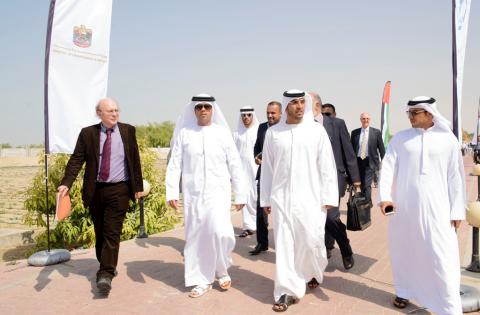
‘The UAE is working to achieve the main objectives set by the Food and Agriculture Organization of the UN with regards to the promotion of global food security,’ says Minister Bin Fahad
October 16, 2014 - Under the patronage of H.E. Minister Dr. Rashid Ahmad bin Fahad, Ministry of Environment and Water, has announced the start of the country’s celebration of World Food Day. The Food and Agriculture Organization of the United Nations (FAO) marks World Food Day each year on October 16 to highlight the role of family farming in reducing hunger and poverty, providing food security and nutrition, improving livelihood improvement, and managing and maintaining natural resources to achieve sustainable development especially in rural areas. This year’s theme is ‘Family Farming: Feeding the World, Caring for the Earth.’
The Ministry, in cooperation and coordination with FAO, organized several environment-related activities and awareness programs for the inauguration. The event was held in one of the certified farms based in Abu Dhabi as part of the continuing move to promote the role of local agricultural products in contributing to the growing needs for food while also highlighting organic agricultural products grown in the country.
During the event, H.E. Eng. Saif Al Shara, Assistant Undersecretary of Agricultural Affairs and Animal Sector, Ministry of Environment and Water, delivered the opening speech on behalf of H.E. Dr. Bin Fahad. Bin Fahad assured that the UAE seeks to achieve the main objectives of the Food and Agriculture Organization of the United Nations with regard to the promotion of global food security, particularly the concept of family farming and its role in providing food. The Minister added that family farming is the dominant pattern in the food production sector. Global estimates indicate that there are about 570 million farms in the world, including 500 million farm families. Reports will show that most of these farms, particularly in countries with low and middle income, have limited space of no more than an area of about two hectares but still contribute significantly to the provision of food on the national and global levels--where production has increased to 80 per cent of global food as well as its important role in the protection of agricultural biodiversity and the preservation of natural resources.
Bin Fahad added that the contribution of family farming to address the food needs of the growing population and in the preservation of the environment requires work like developing the capabilities of smallholders, and that global efforts should be focused - now and in the future - on increasing productivity compared to the unit of the area, in order to ensure access rates for the added productivity of small family farms to match the average of commercial farms.
Meanwhile, Ad Spijkers, FAO Subregional Office Coordinator for the GCC and Yemen and the ad-interim FAO Representative in the UAE A.E., announced that the country has successfully fulfilled the first Millennium Development Goal (MDG) of cutting extreme poverty rates by half as well as reducing the proportion of hungry people and level of undernourishment by less than 5 per cent from 1990 to 1992.
Mr. Spijkers further explained that the slogan for this year’s World Food Day, ‘Family Farming: Feeding the World, Caring for the Earth,’ reflects the global efforts to further promote food security. He added that the UAE is one of the pivotal countries in the move to strengthen global food security through food that passes through the state to the various states the world as a result of excellent infrastructure and transmission lines that link the state with most countries of the world.
For this year’s UAE celebration of World Food Day, numerous student teams participated in several agriculture-related school and university projects to gain insights into the latest information and trends in organic agriculture as well as the importance of conserving natural resources including water. During the event, the director of H.E. Khadem Al Qubaisi’s farm also delivered a short presentation about best practices and measured applied globally, where he highlighted international best practices and standards used to avoid wastage of natural resources, particularly water. The event capped off with a tour around the farm in which the participants learned about greenhouses, vegetable planting projects, irrigation systems, dual agricultural techniques, the collection of waste materials to be used as organic fertilizers and seeds, agricultural products packing, and recycling of agricultural residues and food wastes.
The Ministry has previously launched several initiatives to boost local farms and preserve and develop the country’s agricultural and animal wealth, among them are ‘Nakheelna,’ which aims to strengthen efforts to combat agricultural pests - particularly palm pests; and ‘Intajuna,’ which supports farmers using hydroponics (agriculture without soil). ‘Intajuna’ contributes to the integrated management of water resources and their sustainability.
Categories
- Log in to post comments
